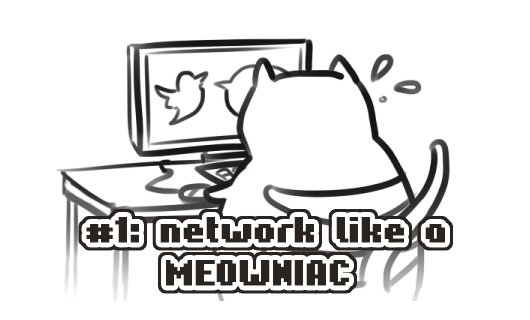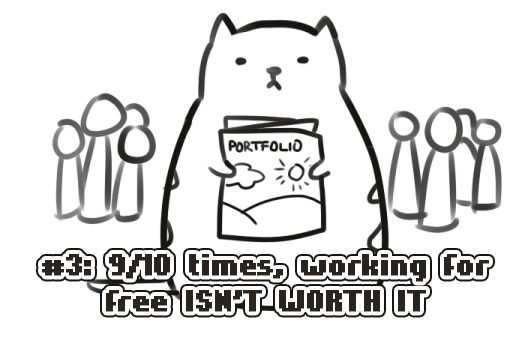I’ve been asked a lot of questions about how to wriggle into freelancing in video game related pursuits recently – mostly artwork, because that’s my specialty – and as I had such a rocky road trying to figure everything out when I was starting out, I figured I’d write a blog post about things that I did that worked, and things I did that didn’t. As a foreigner in Germany, everything when I started was infinitely more complicated than it would’ve been if I were living in a country I was fluent in the language of (mein Deutsch ist nicht sehr gut), so that amplified the stress, physical taxation, and, well, everything. I don’t want others to endure the same struggle, so I’m going to give my advice out in the form of really fat cats, because there’s not a single time a pudgy feline doesn’t put a smile on your face.
NOTE: THIS IS NOT A GOSPEL. THIS IS ADVICE FROM MY PERSONAL PERSPECTIVE. I CAN BE WRONG ABOUT STUFF, BUT THIS HAS WORKED FOR ME. MEOW.

I cannot stress how important this is. Probably the biggest and best piece of advice I received when I started freelancing was one that I didn’t believe at the time as I scoured oDesk for nuggets of a job.
“The best freelance contracts won’t be ones you apply for – they’ll be the ones from people who find you.”
It’s true. Down the track and looking back at half a year freelancing, the best contracts I’ve had haven’t been the ones I’ve desperately applied to on oDesk, hoping for a job that will pay me a measly $100 for an entire game worth of assets, but ones from people I’ve networked with. People who had seen my portfolio, saw the works in progress I posted, people that I follow on social media and interact with.
- Get a social media presence if you don’t already have one, and be active in the community if you want to work with them and for them. Someone you befriend today could be a client in the future.
- Post stuff you’re working on regularly. Remind people of your skill-set.
- Don’t be afraid to advertise the fact you’re looking for work on social media, but do so with restraint. It’s okay to tweet once in a while you’re looking for work, but wouldn’t it be effective to add it to your bio too?

This is another huge thing. I know it’s really tough when you’re starting out as a freelancer and it seems like you have to undercut what you’d like to be paid by heaps because you’re thinking, ‘if I don’t get this contract, I’m fucked’ – but don’t. If you don’t ask for a decent living wage or ask for very little, people aren’t going to think that you’re proud and confident in your work. This is also why I feel that freelance websites like oDesk are very dodgy unless the job is a short one. There are a bunch of international people on oDesk – and most freelancing websites – that live in countries with a lower cost of living than you, so they’re going to charge way less. Don’t make this fact make you undercharge yourself, though.
I talked to a good friend of mine recently who is in the tech business and works with an investor who contracts out a lot of development/design/UI work and he told me:
“Actually, yeah. We ignore all bids from freelancers on jobs we offer that are below a certain amount. People deserve to be paid.”
Dude, dudette, whoever is reading this – you need to charge enough to live on. Freelancing is not the most stable of jobs, so you need to be able to charge enough for a decent living wage for what your profession is, and then account for the possible time you’ll be between contracts. There’s a bunch of good websites out there for calculating how much you should charge as a freelancer, and it was something I struggled with a lot when I started. Here’s roughly how I did mine (and I work mostly with per hour payment, unless otherwise discussed with clients):
- Figure out how much your bills are costing you per month. This is your overhead and your business related expenses are tax deductible in most countries as a freelancer.
- ‘Shop around’ and see what others are charging for the same services. It’s good to see what people of a relative skill level are asking for your work, but again, don’t undersell yourself.
- Add a profit margin of 20-30% to tide you over between contracts, or add enough to get a decent wage per hour that you would expect someone in your field/profession/skill level to have.
- GET A TAX ADVISOR. Mine does all my taxes, deductions and everything, saves heaps of stress and I don’t have to worry about one more thing.
Obviously, as you freelance for a while, you will be able to tweak this figure. But seriously, don’t feel bad if someone inquires about your rate, you give it and they don’t reply. Working for less than you’re worth will make you feel like shit, most of the time.

When I first started freelancing, I was like a moth to a flame when someone would said, ‘hey, this project will be great exposure for you, and you can build up your portfolio at the same time!’. NO. DON’T. PLEASE. READ THIS, IF YOU’RE STILL UNDECIDED. There are some very few exceptions to this rule, which is why I only wrote 9/10, but don’t let yourself get exploited. You waste time you could be using to do actual, paying freelance contracts, and a lot of these ‘unpaid’ projects often don’t get seen to fruition anyway. You will not feel motivated to work on this, and you will not feel committed (9/10 times). You are worth more than exposure, unless it’s a project you’re sure you a.) have the time to handle, b.) have the stress capacity to handle and c.) you know you’re not being exploited by whoever you’re being asked by. Tread very carefully here.

This is one of the biggest issues I had after going from full-time, corporate work to self-directed freelancing. So much of your environment changes, sometimes it’s hard to handle. My nutrition went to absolute shit, I stressed heaps (I still do!), I didn’t leave my apartment for one to two weeks at a time, and I generally felt terrible. It’s hard. You no longer see people every day at work, you just have yourself and 9/10 times, your home will be your office. You feel like you never leave work. I really don’t want this to happen to anyone else the way it happened to me, because it was a turd of a time. Here’s some things I learned that helped, though:
- Work 9 to 5 and give yourself breaks. Don’t let yourself work on contract stuff past these hours unless you have a particularly tough deadline, because this helps separate your work and leisure life.
- Eat regularly. This sounds dumb, but when you’re home all the time, it’s easy to snack constantly OR not eat at all. I’ve done both and my health has gone to shit – make sure you eat good, eat regularly and eat right.
- Find an excuse to leave your house each day if it’s your office. Go for a walk.
- Schedule stuff with friends and your social circle and go to events to make sure you leave the house often and get your social injection. This is so important.
- Make sure you have a support figure in the picture, whether it’s a best friend, your SO or a colleague in the same field. You’re going to need to vent, and there’s usually no-one else in your workspace at the time.
- Install productivity software, like StayFocusd. If you’re just starting freelancing, especially from home, your mind will automatically have profiled the home space to be your fun-happy-time-place and you’re going to waste a bunch of time on Facebook/Reddit/Twitter/whatever. You will probably need the extra force to help you stay on the job.
These are the main points that were big for me, so now I’m going to list some resources that really helped me get into game freelancing.
- /r/gamedevclassifieds – A great place to advertise yourself and see job offers that are going for freelancers or even permanent team members.
- PeoplePerHour – There’s sometimes game stuff posted here and I admit I haven’t used PPH a lot, but it runs on testimonials which seems like a good way of putting yourself ahead of the pack.
- oDesk – Game stuff is posted here, but beware of taking jobs that pay you nothing. I often see jobs on oDesk that give maybe $100 for a full game of assets. Only take jobs that pay you what you’re worth.
- TIGForum’s Offering Paid Work subforum – The TIG Forums are well known and respected in the indie dev community and can be a good place to look every now and then.
- IndieDB’s job page – A bunch of indie companies looking for +1’s, but be careful of whether it’s paid or not.
- IndieGamer’s Paid Work subforum – Like TIGForum’s. Also good, reliable place most of the time.
- Pixel Prospector’s Big List of Freelancer Things – Self explanatory, and Pixel Prospector is the best thing ever.